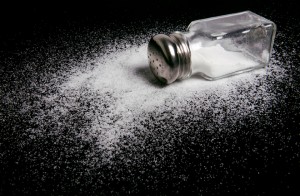This past weekend I went home to visit friends and family. I stopped by my great-grandma’s house to see how she was feeling and spend some time with my favorite woman. While talking about her last doctor appointment, she told me she was put on a low-sodium diet. But my curiosity began to lead me to question: does a low-sodium diet actually benefit you? 
I decided to Google the matter. There were many articles by magazines and health websites saying “salt is bad.” However, what I found extremely interesting was the fact that there were articles from The Wall Street Journal, NBC, and Reuters all claiming that a new study found salt was not that bad for you.
The New England Journal of Medicine published an international study of 100,000 people showed that if you are not over 60, eating way too much salt, or do not currently have high blood pressure, salt will not have a significant impact on your blood pressure. It is currently recommended by federal guidelines that people consume between 1,500-2,300 milligrams per day. The American Heart Association recommends 1,500 milligrams. However, most people consume between 3,000-6,000 milligrams and only four percent of respondents followed the recommended levels. The study found that people who consume the average amount of 3,000-6,000 milligrams a day had a lower risk of death and cardiovascular events than people who had more than 6,000 milligrams or less than 3,000 milligrams. People that consumed over or under the average U.S. daily consumption level had a 27% higher risk of death or a serious event.
While these surprising findings would encourage some people to pile on the salt, you should still be careful. The studies conducted were all observational and followed participants for almost four years. There was also a lack of cause and effect and the studies did not rule out confounding variables so there is still some question on whether or not salt caused an increase or decrease. Another problem is that the studies were too short to make long-term conclusions. According to the president of the American Heart Association, “cardiovascular disease can take decades to develop.” The last issue with the studies is how the sodium levels were measure. The samples were all taken through urine, which could be altered by diet and eating habits of participants.
So while it seems like adding the salt onto our food may benefit us according to the study, there does not seem to be enough information to conclude whether or not this is true. And in the case of my great-grandma, it seems best that she continues her low-sodium diet even though she misses using salt greatly.
Sources:
http://www.nbcnews.com/health/heart-health/pour-salt-new-research-suggests-more-ok-n179941
http://www.reuters.com/article/2014/08/13/us-cardiovascular-disease-sodium-idUSKBN0GD22520140813
